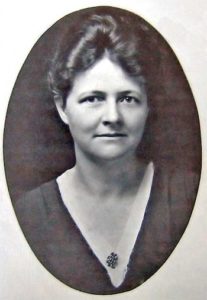
Jessie Daniel Ames
*Jessie Daniel Ames was born on this date in 1883. She was a white suffragist and American Civil Rights leader. She was born Jessie Harriet Daniel in Palestine, Texas.
Her mother was Laura Maria Leonard, and her father was James Malcolm Daniel. Ames was admitted to the Ladies Annex of Southwestern University at 13 and graduated with a Bachelor of Arts in 1902. After graduation, she moved with her family to Laredo, Texas. Ames followed her mother and sister and converted to Methodism despite her father's objection as a nonbeliever. She had joined them in church activities from an early age. In 1905, Ames married Roger Post Ames, a surgeon in the United States Army who had worked with Walter Reed in Cuba.
Roger Ames died in 1914 in Guatemala from blackwater fever. She had a son and two daughters, the last of whom was born in 1914 after her husband's death. After her father died in 1911, Ames helped her mother run the family's telephone company in Georgetown. She also became involved with several Methodist women's groups, which led to her initial participation in the women's suffrage and anti-lynching movements.
1916, Ames organized the Georgetown Equal Suffrage League and became its first president. She also wrote a weekly suffrage article in the Williamson County Sun newspaper called "Woman Suffrage Notes." Ames became a protégé of Minnie Fisher Cunningham, the president of the Texas Equal Suffrage Association (TESA). In 1918, Ames was elected treasurer of the TESA. Texas became the first southern state to ratify the Nineteenth Amendment in June 1919. In October 1919, Ames founded the Texas League of Women Voters and served as its first president until 1923. 1923, she represented the National League of Women Voters at the Pan-American Congress. She also served as a delegate to the Democratic National Conventions of 1920, 1924, and 1928.
Ames served in several other organizations, including the Texas branch of the American Association of University Women, the Texas Committee on Prisons and Prison Labor, and the Texas Federation of Women's Clubs. She was an officer of the Joint Legislative Council in Texas, also known as the Petticoat Lobby. She was on the Board of Education of the Women's Division of the Methodist Church. In 1924, Ames became the director of the Texas Commission on Interracial Cooperation (CIC).
In November 1930, with the CIC's financial help, founded the Association of Southern Women for the Prevention of Lynching (ASWPL) with headquarters in Atlanta. Ames served as the director of the ASWPL until 1942; judging that the purposes of the ASWPL had been achieved, Ames wound the association up. She was among the first southern white women to speak out and work publicly against the lynching of Blacks, murders that white men claimed to commit to protect women's "virtue." Despite risks to her safety, Ames stood up to these men and led organized efforts by white women to protest lynching. Ames retired to Tryon, North Carolina, before returning to Texas in 1968 to live with her younger daughter.
Jessie Daniel Ames died of pneumonia in Austin, Texas, on February 21, 1972. She is buried in the family plot in the I.O.O.F. Cemetery in Georgetown, Texas. In 1985, the Jessie Daniel Ames Lecture Series began at Southwestern University. Her career as an activist for suffrage and against lynching was the subject of the Freshman Symposium at Southwestern University in 1985 and the Brown Symposium at the university in 1986.